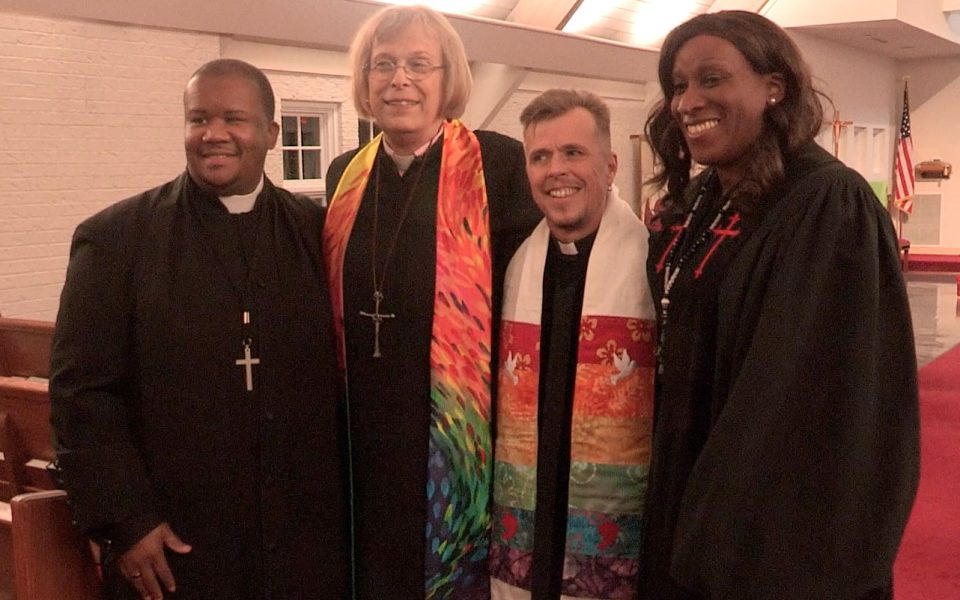“I
like Southern hospitality,” the Rev. Dawn Flynn says on camera. “I like the
laid-back attitude of the South.”
She
sits in the front of her Gastonia church, New Life MCC, red carpet covering the
floor and a pulpit in the background. She pauses, the cross around her neck
shifting slightly.
“Granted,
it’s not a place where I would want to wear a tag around my neck saying, ‘I’m
transgender,’ because it would be asking for people to kill me.”
Flynn,
along with three other current and former North Carolinian clergy members
gathered in the Byrum Welcome Center on Wake Forest University’s campus on Oct.
3 for a screening of Proper Pronouns.
The
in-progress documentary opened the OUT at the Movies International LGBT Film
Fest in Winston-Salem, kicking off the series of 27 films with a focus on
transgender clergy members.
“There’s
only approximately 30 ordained trans clergy in the country,” Flynn told Triad
City Beat.
The
group caught the attention of director Meg Daniels, a cisgender woman, during
her time in the Documentary Film MFA program at Wake, while in the company of
Liam Hooper, one of the first transgender men to graduate from the university’s
divinity school. While filming, Hooper worked as a minister, and has since
converted to Judaism.
The
camera pans over the cobblestone paths and wooden bridge near Old Salem in
Winston-Salem. A church with white-slatted walls holds a small, somber
congregation. Tealight candles flicker as Hooper looks over the group. He reads
from a stack of paper, rather than a verse or a book.
“I
am going to read the names of the trans people who have been murdered, today,”
he says.
Each
name he reads receives an echo, an affirmation from the people in the pews.
Each person walks forward and leaves a small glass bead in a jar, with a wish
or a short prayer.

Many of the subjects found the filming of their experiences asked them to be vulnerable. For Pastor Mykal Shannon of Dynamic Faith Ministries in Asheboro, the film allowed a chance to further his goals in raising awareness about LGBT lives in the church. He sees ministry as a chance to not only preach non-denominational Christianity, but to address the causes of the issues people pray about with his own actions.
“How
else to be more authentic and transparent than to be in a film?” he said to TCB.
On
screen, he marches on a city street among a sea of people. Off on a sidewalk,
counter-protesters shout, armed with accusations of sin and signs that read,
“America’s Judgement is coming,” in bold letters. Yet, Shannon and others walk
past, unperturbed.
He
makes his way up onto a stage at the end of the road, the crowd falling silent.
“I
am a black man, in a transgender body, in the Bible Belt with a pulpit as a
platform,” he asserts. “And I intend to take a stand.”
The
Rev. Debra J. Hopkins insists that the experiences they offer up must be
acknowledged as being affected by all facets of their identities, including
race.
“I’ve
always believed in our story being told accurately,” Hopkins said to TCB.
“Those voices needed to be heard.”
The
leader of Essentials for Life Ministries in Charlotte, Hopkins gives sermons
and runs There’s Still Hope, a nonprofit that provides resources and emergency
shelter to homeless transgender people.
“We’re
all cut from the same cloth,” Hopkins said.
The
camera follows Hopkins around her home. She leads the crew into her room and
pauses by the closet door. Swinging it open, the hooks on the door can be seen,
robes hanging from it. The reverend rifles through the clothes, searching for a
particular item. She finds it, raising her hand with the hanger in it up high,
and showing off the stole and collar with her free hand.
“That’s
the robe,” she says, grinning. “I’m proud of this robe.”
Join the First Amendment Society, a membership that goes directly to funding TCB‘s newsroom.
We believe that reporting can save the world.
The TCB First Amendment Society recognizes the vital role of a free, unfettered press with a bundling of local experiences designed to build community, and unique engagements with our newsroom that will help you understand, and shape, local journalism’s critical role in uplifting the people in our cities.
All revenue goes directly into the newsroom as reporters’ salaries and freelance commissions.


Man, what the FUCK???